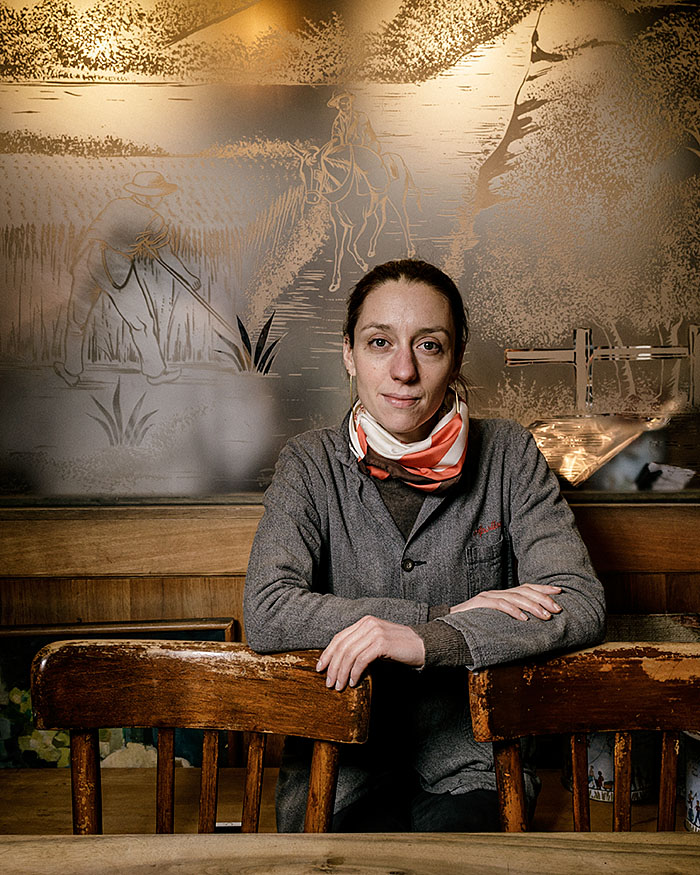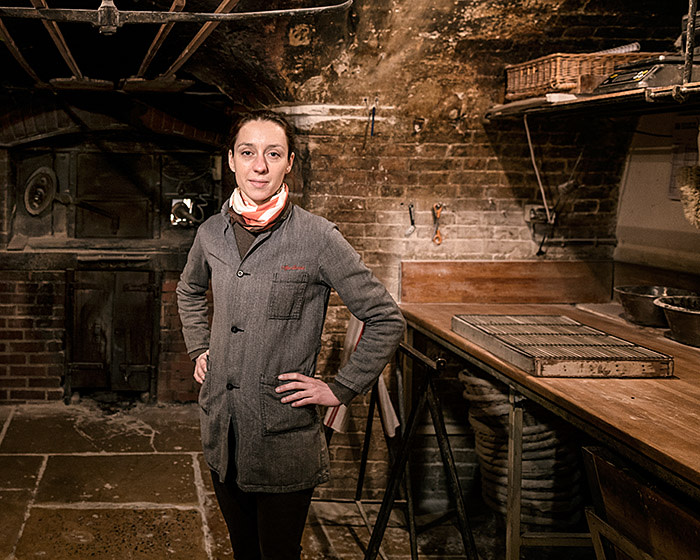On the rise: taking on a baking dynasty

Roula Khalaf, Editor of the FT, selects her favourite stories in this weekly newsletter.
Apollonia Poilâne was born into the eponymous family bread business. Even her crib was made from a breadbasket. Now, the 33-year old chief executive is the third generation to run the French family bakery, which is acclaimed at home and overseas for its distinctive 1.9kg sourdough loaf with a thick crust.
Known as a miche or pain Poilâne, the loaves are made from stone-ground flour and sea salt with no preservatives or additives, and baked over a wood fire.
“To me there’s always been a sense of obviousness [in] taking over the family business,” says Ms Poilâne, who was born in New York to an American mother and a French father and has run the company for the past 15 years. “One of those challenges has definitely been how to appropriate that heritage and make it my own.”
Ms Poilâne always knew she would take over the business, but the moment came far too soon. On October 31 2002, her parents were killed in a helicopter crash off the coast of Brittany, in north-west France. Ms Poilâne had just left school and was working in the bakery before starting at Harvard College, part of the university, the following year.
She went ahead with her plan and from 2003 to 2007 directed Poilâne from Boston, managing it via telephone calls, email, video conferencing and frequent travel across the Atlantic.
Ms Poilâne says her time at Harvard “helped me honour my dual culture — French and American — but also deepened my appreciation of my parents’ education, which was very much about opening up to other cultures and opening your mind to new things”.
At 18, she was managing people who had been in the business for years. The answer was “dialogue and clear communication”, she says. “Immediately after my parents’ passing, the maintaining of our tradition made us overlook the age difference — in other words, there was no time for these thoughts.”
She is speaking at her offices above the company’s original bakery shop on Rue du Cherche Midi in Paris’s Saint-Germain-des-Prés district, where as a child she would spend Wednesday and Saturday afternoons learning the craft. Her Jack Russell dog, Tiger Lily, is asleep nearby on a sofa.
The aroma of bread and pastries greets customers the moment they enter the shop. A set of stone stairs leads to the basement and the enveloping heat of an enormous wood-fired oven that can bake 70 loaves at a time.

The building, within the walls of a former convent, is where Pierre Poilâne first opened the bakery in 1932. His son Lionel, Ms Poilâne’s father, took over the bakery in the early 1970s. He is credited with transforming the company into an international brand, opening its first store outside France, in London in 2000. He launched a manufacturing site in Bièvres, near Versailles, from where the loaves can be shipped anywhere in the world within 24 hours.
Poilâne’s customers for sourdough loaves have included Frank Sinatra and the actor Gérard Depardieu. Salvador Dalí, the Spanish surrealist painter, asked Poilâne to make a whole bedroom out of bread for him at Le Meurice hotel, including a Poilâne chandelier. A replica of the latter hangs in a room behind the shop on Rue du Cherche Midi.
Thoughtful and measured, Ms Poilâne has continued to expand the business. She talks about bread in spiritual terms. “Bread is about bringing together humans,” she says. “The French word copain — [which] means friend, coming from the person with whom you share bread — reflects this.”
In recent years Ms Poilâne has travelled as far as Japan and Myanmar in search of inspiration. In Japan, she learnt about the culture of rice and its different byproducts and how adzuki beans are used in cooking.
All this, she says, reflects “the curiosity which my parents insisted on in our upbringing, questioning the status quo and trying to go further than what meets the eye. That is the most precious gift they’ve given to my sister and me.”
Ms Poilâne oversees a business that has a €12m turnover and makes between eight and 10 tonnes of bread a day, including 5,000 sourdough loaves. As well as to the French market, Poilâne bread is shipped to more than 40 countries. The business has a network of 1,500 retailers in France and worldwide.
The bakers work day and night shifts. The fermentation process for each batch of loaves is started by the use of a piece of naturally leavened dough from the previous batch. As such, says Ms Poilâne, each loaf is a direct descendant of those baked by her grandfather.
She oversees a team of 180 employees, a third of whom are bakers. Many of the staff have worked at the company for years, even decades.
She aims to sit down with staff members for breakfast each day and says, as a manager, she operates “an honest and very straightforward conversation, with facts and figures to make sure that we make decisions that are informed and that make sense”. Ms Poilâne’s sister Athena, two years younger and a visual artist, is also involved in some strategic aspects of the business.
Since Ms Poilâne took over, the business has expanded, with new shops and new products that include pepper bread, buns and spoon-shaped biscuits.
What do the years ahead have in store for Poilâne? “More cereals, more grains, more exploration, more biscuits, more pastries, more bread. But all in due course,” Ms Poilâne says. “It’s not about the quantity, it’s about the quality . . . It’s not about growing, it’s about elevating the business, creating a virtuous circle to [improve] people’s everyday bread staples.”
Comments